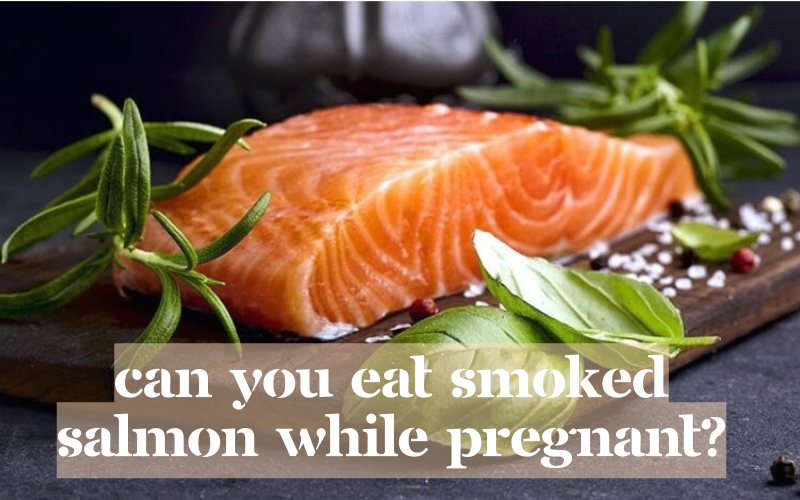Eating smoked salmon during pregnancy is a controversial topic. While some sources say it’s completely off-limits, others argue that eating it in moderation is fine. So what’s the real answer? Can you indulge in some delicious smoked salmon when you’ve got a bun in the oven? Let’s find out.
The Potential Risks
There are two main health concerns with eating smoked salmon during pregnancy:
-
Listeria – This bacteria can contaminate certain foods, like smoked seafood, soft cheeses, and deli meats Listeria infection in pregnancy can cause miscarriage, premature birth, and other complications
-
Parasites – Smoked salmon can harbor parasites like tapeworms. Parasites are rare but potentially harmful during pregnancy.
These risks apply mainly to cold smoked salmon, which is not cooked. The curing process does not kill listeria or parasites. Hot smoked salmon reaches higher temperatures which destroy most bacteria and parasites.
However, both cold and hot smoked salmon can become contaminated after processing through improper storage, handling, or cooking.
Current Recommendations
-
The NHS advises pregnant women to avoid all cold smoked seafood due to the listeria risk This includes smoked salmon, mackerel, trout, and tuna
-
The Food Standards Agency recently extended this advice to also avoid hot smoked seafood, unless it’s reheated until piping hot.
-
The US FDA says pregnant women can eat hot smoked salmon as long as it’s reheated to 165°F. They recommend avoiding refrigerated cold smoked salmon.
-
Health Canada follows similar guidance, permitting hot smoked salmon when thoroughly cooked. They advise pregnant women to avoid cold smoked salmon.
So the consensus is to avoid cold smoked salmon during pregnancy. Hot smoked salmon may be safe when served freshly cooked or reheated until very hot.
However, there’s still a potential risk of contamination after processing. So experts recommend pregnant women eat hot smoked salmon in moderation.
Safer Alternatives
Instead of smoked salmon, pregnant women can get those delicious smoky, salty flavors from safer alternatives:
-
Canned salmon – Opt for a shelf-stable canned salmon like sockeye salmon. Choose cans without dents or bulges.
-
Cooked salmon – Prepare baked, grilled, or pan-seared salmon at home. Cook to 145°F.
-
Salmon jerky – Seek out brands that use pressure and heat to destroy pathogens.
-
Smoked spice blends – Get the smoky taste without the salmon from spice rubs and seasonings.
-
Smoked nut mixes – Almonds, pecans, and other nuts can be smoked to add flavor.
Tips for Safe Consumption
If you do choose to eat hot smoked salmon while pregnant, follow these food safety guidelines:
-
Purchase from reputable retailers – Avoid roadside smoked seafood stands or questionable sources.
-
Check the labeling – Product should say “hot smoked”, “fully cooked”, or “ready to eat”.
-
Look for the USDA inspected stamp – Ensures safe processing standards were followed.
-
Check the expiration date – Don’t purchase or consume expired smoked salmon.
-
Store properly below 40°F – Keep smoked salmon refrigerated at all times before cooking.
-
Heat to 165°F before eating – Use a food thermometer to verify temperature.
-
Consume within 3-4 days – Don’t eat leftovers past 3-4 days, even when refrigerated.
-
Avoid cross-contamination – Use separate plates, utensils, etc. when handling raw and cooked salmon.
The Takeaway
Can you eat smoked salmon when pregnant? The safest approach is to avoid cold smoked salmon and eat hot smoked salmon no more than 2-3 times a month when thoroughly reheated. For daily omega-3s, opt for safer salmon alternatives. With proper handling and cooking, pregnant women can still enjoy smoked salmon occasionally. Just remember to take precautions to reduce the risk of foodborne illness.

What are the benefits of eating fish for you and your baby?
Fish is an excellent source of protein and vitamin D2, and oily fish is a rich source of omega-3 fatty acids. You can read more about the vitamins and supplements you need during your pregnancy here.
The benefits of eating fish for you include2:
- Supporting heart health and helping to prevent heart disease
- Strong healthy bones – this is due to some types of fish containing bones that you can eat, meaning that they contain plenty of calcium and phosphorus
- Helping you to maintain a healthy weight during your pregnancy, as white fish is also low in fat
There’s also some evidence to suggest that the nutrients contained in fish (specifically omega-3 fatty acids) can help to reduce the risk of preeclampsia, premature labour, and postnatal depression3.
As well as the benefits for you, eating fish can have benefits for your growing baby too. The omega-3 fatty acids it contains can help to support your baby’s brain development as they grow in the womb, as well as their eyes1 and nervous system2. Eating fish can also lead to your baby being born at a healthy weight3, strengthen their bones4 and reduce the risk of food allergies and eczema1.
How much fish should I eat in pregnancy
According to the NHS, everyone should eat at least two portions of fish a week, one of which should be an oily fish such as salmon or sardines2.
If you’re pregnant, or planning to have a baby, then you should avoid eating more than two portions of oily fish per week, as it may contain pollutants that can affect your baby’s development2.
Can you eat raw salmon when pregnant?
FAQ
Can you eat smoked salmon if pregnant?
Salmon, including smoked salmon, contains a multitude of health benefits for pregnant women, including Omega 3 fatty acids essential for fetal development.Nov 5, 2024
Can I eat canned salmon while pregnant?
Can I eat a lox bagel while pregnant?
No, it’s generally not recommended to eat lox (smoked salmon) while pregnant, especially if it’s not cooked. Lox is a type of smoked fish that can be a source of listeria, a bacteria that can be harmful to both mother and fetus during pregnancy.
Is it safe to-eat cold-smoked salmon?
